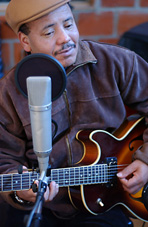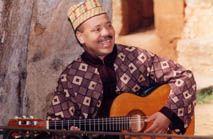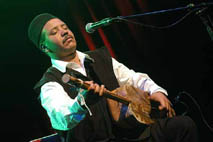Majid Bekkas
After Tinariwen from the Sahara, please welcome another master of
the Desert blues, Majid Bekkas from Morocco. Centuries ago, his ancestors
were brought there as black slaves. Nowadays, Bekkas's soft-voiced "trance
music" enchanted audiences at Womex in Sevilla and Grenoble jazz
festival.
 American
continent is not the only place where descendants of black slaves make
wonderful music. The Moroccan Gnawas are well known for their trance
music and healing rituals. Their history spans more that 4 centuries.
When the Moroccan army captured Timbuktu in 1591, several thousand
men and women were brought north as slaves. Caravans were transporting
unfortunate black Africans to the slave market of Marrakech. This lasted
until 1912. "Tied in sacks they brought us, in the camel bags.
And they sold us in the wool market. May God pardon them." Other
Moroccans look at Gnawas with mixed curiosity and supremacy. Their
music is linked to the sub-Saharan spiritual world. Their mournful
singing, shattering rhythm of the metal castanets and bass-guitar like
sound of guimbri make base for the all night lila rituals, which culminate
in the exorcist session early in the morning. American
continent is not the only place where descendants of black slaves make
wonderful music. The Moroccan Gnawas are well known for their trance
music and healing rituals. Their history spans more that 4 centuries.
When the Moroccan army captured Timbuktu in 1591, several thousand
men and women were brought north as slaves. Caravans were transporting
unfortunate black Africans to the slave market of Marrakech. This lasted
until 1912. "Tied in sacks they brought us, in the camel bags.
And they sold us in the wool market. May God pardon them." Other
Moroccans look at Gnawas with mixed curiosity and supremacy. Their
music is linked to the sub-Saharan spiritual world. Their mournful
singing, shattering rhythm of the metal castanets and bass-guitar like
sound of guimbri make base for the all night lila rituals, which culminate
in the exorcist session early in the morning.
Majid Bekkas was raised in a Gnawa family in Salé, on the Atlantic
coast of Morocco. where he began playing the guimbri in healing ceremonies.
Inspired by the traditional-pop fusion of the group Nass El Ghiwane in the '70s, he began to branch out, and never stopped. Playing guitar
and guimbri and singing in a variety of styles, he has worked with
popular, jazz and experimental musicians. Fours years ago he emerged
as a talent in his own right.
His albums African Gnaoua Blues (Igloo, 2001) and Mogador (Igloo, 2004)
show links both to the American bluesman John Lee Hooker and the Malian
guitarist Ali Farka Touré. Bekkas is fascinated by the similarities
between Gnawa and blues, both musical genres created by African slaves
in a foreign cultural context. When an African musician hears black
music from America, he notices kinship. He can play the same tune,
but with a different feeling. An transcultural discharge occurs, soft
blue notes cascading like summer lightning.
Resembling American blues, also Bekkas's songs have the power of personal
statement. On stage, he switches guitar with the traditional Gnawa
guimbri. A wooden flute and percussion complete very intimate soundscape.
If you are looking for Taj Mahal with African charm, meet Majid Bekkas.
 |
|
 |
Web:
www.orientaljazz.com
www.earthbeat.nl
www.afropop.org
www.orientaljazz.com
www.mondomix-media.com/womex
Music:
real-audio
Download:
 |
|
JPEG
150 x 100 mm
300 dpi
|
 |
|
JPEG
60 x 90 mm
300 dpi
|
<back>
|